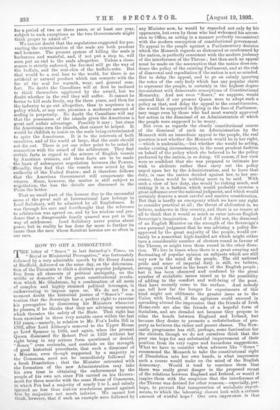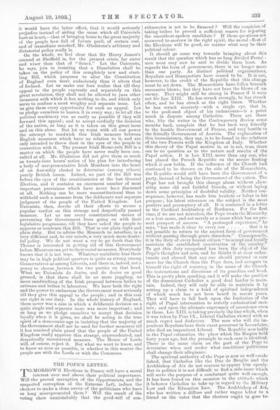HOW TO GET A , DISSOLUTION.
THE letter of " Senex " in last Saturday's Times, on "Royal or Ministerial Prerogative," was fortunately followed by a very admirable speech by Sir Henry James at Sheffield, delivered on the same day, on the determina- tion of the Unionists to elicit a distinct popular judgment, free from all elements of political ambiguity, on the merits or demerits of the great constitutional revolu- tion which Mr. Gladstone, by a combination of all sorts of complex and highly strained political leverages, is endeavouring to impose upon us. We do not for a moment doubt the historical justice of " Senex's " con- tention that the Sovereign has a perfect right to exercise his prerogative by dismissing his Ministers whenever he pleases, if he thinks that they are advising measures which threaten the safety of the State. That right has been exercised in three very notable cases within the last 110 years,—namely, in relation to Mr. Fox's India Bill in 1783, after Lord Althorp's removal to the Upper House as Lord Spencer in 1884, and again, when the present Queen dismissed Sir Robert Peel in 1839 without her right being in any serious form questioned or denied. " Senex " even contends, and contends on the strength of good historical precedents, that such a dismissal of a Minister, even though supported by a majority in the Commons, need not be immediately followed by a fresh Dissolution ; that the Minister entrusted with the formation of the new Administration may take his own time in obtaining the endorsement by the people of his own act, since Pitt carried on his Govern- ment for three months with the same House of Commons, in which Fox had a majority of nearly 2 to 1, and calmly ignored no less than sixteen resolutions passed against him by majorities not much inferior. We cannot but think, however, that if such an example were followed by any Minister now, he would be regarded not only by his opponents, but even by those who had welcomed his access- sion to Office, as acting in a manner perfectly inconsistent with the modern conception of constitutional government. To appeal to the people against a Parliamentary decision which the Monarch regards as +distrusted or condemned by the nation, is perfectly consistent with the modern jealousy of the interference of the Throne ; but then such an appeal must be made on the assumption that the nation does con- demn the policy of the existing Parliament, and at the risk of disavowal and repudiation if the nation is not so minded. But to delay the appeal, and to go on calmly ignoring the votes of the only body which has any popular claim to represent the people, is certainly in the highest degree inconsistent with democratic conceptions of Constitutional Monarchy. And not even " Senex," we suppose, would contend that if our present Queen were to adopt such a policy as that, and delay the appeal to the constituencies, she would be supported in flying in the face of Parliamen- tary usage even by those who had most warmly approved her action in the dismissal of an Administration of which the people were supposed to be weary. But even as regards the clearly constitutional course of the dismissal of such an Administration by the Monarch with an immediate appeal to the people, the real question is not whether the Monarch would be in her right, —which is undeniable,—but whether she would be acting, under existing circumstances, in the most prudent fashion on behalf of the policy which she believed to be the policy preferred by the nation, in so doing. Of course, if her view were so confident that she was prepared to intimate her wish to abdicate rather than carry out the policy urged upon her by the Administration, and to leave that duty, in case the nation decided against her, to her suc- cessor, there would be nothing more to be said. With such a view of her duty, she would be risking much, and risking it in a fashion which would probably exercise a great influence over the national judgment, and which would certainly deserve a most careful and mature consideration. But that is hardly an emergency which we have any right to consider practical at all ; the threat of abdication is, we believe, unknown in this country, and there is no reason at all to think that it would so much as enter into an English Sovereign's imagination. And if it did not, the dismissal of an English Minister on the strength of the Sovereign's own personal judgment that he was advising a policy dis- approved by the great majority of the people, would cer- tainly be a somewhat high-banded act which might either turn a considerable number of electors round in favour of the Throne, or might turn them round in the other direc- tion. We live in times when there is a great swaying and fluctuating of popular opinion on subjects which are still very new to the mind of the people. The old national pride and sense of imperial duty is still, we believe, strong, even if latent in the heart of the English people ; but it has been obscured and confused by the great number of socialistic issues raised as to the possibility of adding to the comfort and well-being of the poor, that have recently come to the surface. And nobody can tell how far the hunger for experiments of this kind might not obliterate the greater issue as to the Union with Ireland, if the agitators could succeed in spreading abroad the impression that the friends of Irish Home-rule are also the friends of a hopeful form of Socialism, and are dreaded not because they propose to relax the bonds between England and Ireland, but because they desire to promote a redistribution of pro- perty as between the richer and poorer classes. The New- castle programme has still, perhaps, some fascination for the electors, though we do not ourselves think that the poor can hope for any substantial improvement of their position from its very vague and hazardous suggestions. What we have to consider when advisers like " Senex " recommend the Monarch to take the constitutional right of Dissolution into her own hands, is what impression such a course would make on the mind of the English democracy. Would it tend to convince them that there was really great danger in the proposed recast of the relations between England and Ireland, or would it inspire them with the suspicion that the interference of the Throne was devised for other reasons,—especially, per- haps, to prevent that inauguration of socialistic experi- ments, to which the labouring classes look with a certain amount of wistful hope ? Our own impression is that it would have the latter effect, that it would seriously prejudice instead of aiding the cause which all Unionists have at heart,—that of bringing home to the great majority of the people how full of future peril, of certain cost, and of immediate mischief, Mr. Gladstone's arbitrary and dictatorial policy really is. On the whole, we feel clear that Sir Henry James's counsel at Sheffield is, for the present crisis, far surer and wiser than that of " Senex." Let the Unionists, he says, join in insisting that a Dissolution shall be taken on the policy of this completely new and start- ling Bill, which proposes to alter the Constitution of England even more audaciously than it alters that of Ireland. Let us make our foes realise that till they appeal to the people expressly and separately on this great revolution, they shall not be allowed to pass other i measures with which it has nothing to do, and which only serve to confuse a most weighty and separate issue. Let us give them every opportunity for such an appeal. Let us pledge ourselves to hasten it in every way; to let all the political machinery run as easily as possible if they will forward this appeal ; and to accept cordially the decision of the nation, so long as it is taken on this great issue and on this alone. But let us resist with all our power the attempt to sandwich this Irish measure between English measures which have no relation to it, and are only intended to throw dust in the eyes of the people in connection with it. The present Irish Home-rule Bill is a matter on which the people have never really been con- sulted at all. Mr. Gladstone did not give them so much as twenty-four hours' notice of his plan for introducing a body of unrepresentative Irish Members into the heart of an Assembly elected to determine (among others) purely British issues. Indeed, no part of the Bill was before the eyes of the constituencies at the last General Election, and it contains an enormous number of most important provisions which have never been discussed at all. Nothing can be more unconstitutional than to withhold such a measure from the deliberate and separate judgment of the people of the United Kingdom. Let Unionists, then, devote all their efforts to secure a popular verdict on this strange and despotically passed measure. Let us use every constitutional means of preventing the Government from going on with their legislative programme, till they have asked the people to approve or condemn this Bill. That is our plain right and plain duty. But to advise the Monarch to interfere, is a very different and, to our minds, a very much more doubt- ful policy. We do not want a cry to go forth that the Throne is interested in getting rid of this Government before Ministers can get to their social measures. Everybody knows that it is not true. Whatever socialistic bias there may be in high political quarters is quite as strong among Conservatives as among Liberals, and there is, indeed, not a penny to choose between the two parties on that head. What we Unionists do desire, and do desire on good ground, is that there shall be no more juggling, no more sandwiching of the Irish proposal between bribes to artisans and bribes to labourers. We have both the right and the power to embarrass the Government most seriously till they give this appeal to the people ; and in this case our right is our duty. In the whole history of England, there never was a case in which a deliberate decision on a quite single and separate issue was more important ; and so long as we pledge ourselves to accept that decision loyally when it is given, we shall be acting in the true spirit of a democratic age in insisting that the majority of the Government shall not be used for further measures till it has received plain proof that the people of the United Kingdom really approve this strange, unprecedented, and despotically manoeuvred measure. The House of Lords will, of course, reject it. But what we want to know, and to know as soon as possible, is whether in this matter the people are with the Lords or with the Commons.



































 Previous page
Previous page